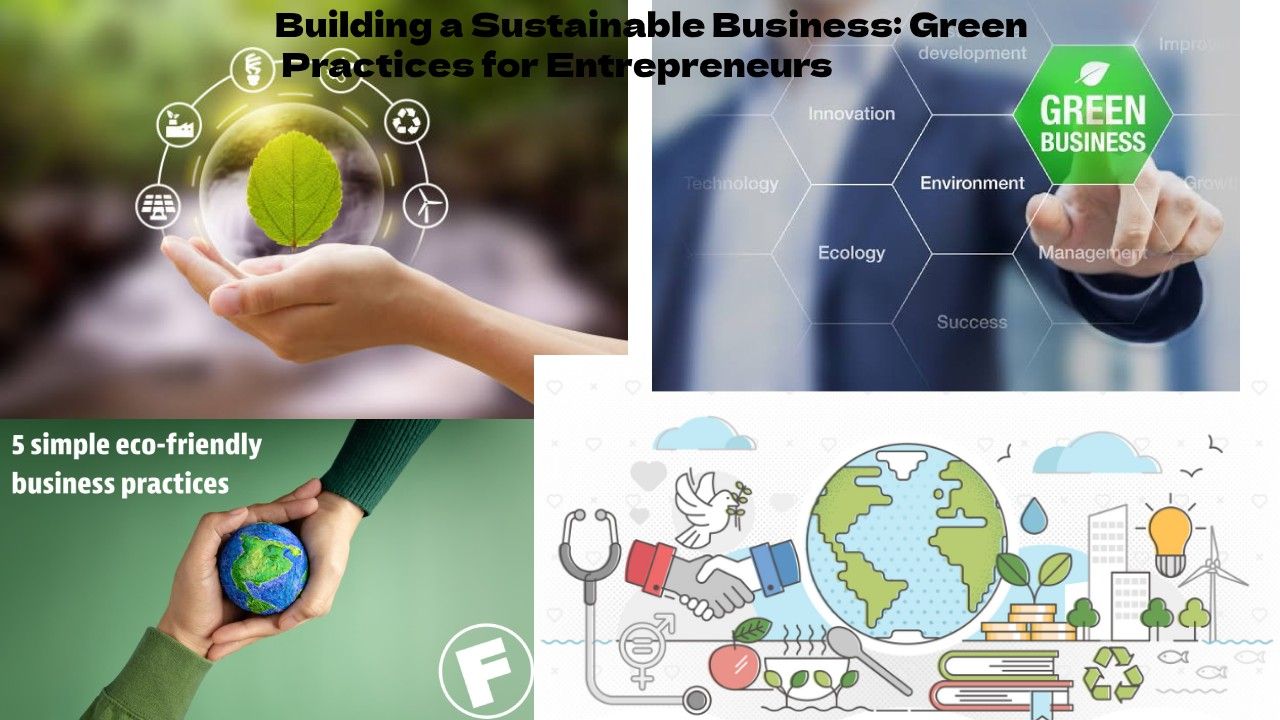- 1 Introduction to Building a Sustainable Business
- 2 Why Sustainability Matters to Businesses
- 3 Green Practices for Entrepreneurs
- 3.1 1. Begin with a Sustainable Business Model
- 3.2 2. Reduce Energy Consumption
- 3.3 3. Reduce Waste
- 3.4 4. Source Responsibly
- 3.5 5. Inclusion of Sustainable Transportation
- 3.6 6. Educate and Involve Employees
- 3.7 7. Adopt Sustainable Marketing Practices
- 3.8 Success Stories: Learning from Green Entrepreneurs
- 4 Final Thoughts

Introduction to Building a Sustainable Business
In today’s green-conscious world, Building a Sustainable Business is no longer an option but a necessity for businesses. Entrepreneurs have the unique opportunity to incorporate green practices into their business models, not only to contribute to the health of the planet but also to attract eco-conscious consumers and build long-term success.
This book examines how entrepreneurs build sustainable businesses through eco-friendly practices, brand reputation improvement, and positive environmental influence.
Why Sustainability Matters to Businesses
Sustainability simply means the ability to meet the present needs without compromising the future generations’ ability to meet their needs. For businesses, it implies practices that reduce impact on the environment while promoting economic and social well-being.
Key Benefits of Green Practices:
Consumer Appeal: The modern customer likes a brand that matches his or her values, especially environmental responsibility.
Cost Savings: Sustainable practices often reduce the cost of running a business, such as energy efficiency and waste reduction.
Regulatory Compliance: Governments are enforcing strict environmental laws, making sustainability a competitive advantage.
Resilience: Sustainable businesses are more resilient and better placed to adapt to changing environmental and market conditions.
Green Practices for Entrepreneurs
1. Begin with a Sustainable Business Model
A sustainable business starts with a mindful model that considers environmental, social, and economic factors.
Eco-Friendly Products/Services: Design products that are biodegradable, recyclable, or energy-efficient.
Circular Economy: Consider a model where resources are reused, recycled, or upcycled to minimize waste.
2. Reduce Energy Consumption
Energy efficiency is one of the simplest and most impactful ways to reduce a business’s environmental footprint.
Use Renewable Energy: Invest in solar panels or switch to green energy providers.
Install Energy Efficient Appliances: Replace outdated devices with energy-efficient versions.
Maximize Office Lighting: Utilize LED bulbs and sunlight to save energy.
3. Reduce Waste
Waste reduction saves both the environment and money.
Paperless Environment: Switch to electronic records and communication.
Recycle and Compost: Have recycling boxes and compost organic materials.
Minimal Packaging: Use minimal, biodegradable, or recyclable packaging materials.
4. Source Responsibly
Only source from suppliers that share similar values of sustainability and responsibility.
Local Sourcing: Decrease the carbon footprint of transportation by sourcing materials locally.
Fair Trade Products: Sourcing raw materials for their production ensures that it will not harm workers or the communities.
Sustainable Materials: The use of renewable or recycled materials in the product or operation.
5. Inclusion of Sustainable Transportation
Transportation is one of the leading contributors to greenhouse gases. Entrepreneurs can help by:
Reduce Commuting Emissions- The ability to work from home saves a lot of commute emission.
Using Electric Vehicles: Invest in EVs for business operations or logistics.
Promoting Public Transit: Incentivize employees to use public transportation or carpooling.
6. Educate and Involve Employees
Creating a culture of sustainability requires team effort.
Training Programs: Educate employees on eco-friendly practices and the company’s sustainability goals.
Green Initiatives: Encourage activities like tree planting, clean-up drives, or energy-saving campaigns.
Incentives: Reward employees who suggest or implement green practices.
7. Adopt Sustainable Marketing Practices
How you market your business can also reflect your commitment to the environment.
Digital Marketing: Focus on paperless, energy-efficient marketing channels like social media and email campaigns.
Eco-Friendly Merchandise: Use sustainable materials for promotional items.
Transparent Communication: Share your sustainability goals and achievements with your audience.
Measuring Sustainability Efforts
To make sure your business stays on track, regularly monitor and measure your sustainability efforts:
Carbon Footprint Analysis: Calculate your business’s emissions and identify areas for improvement.
Sustainability Reports: Prepare yearly reports on your environmental activities and achievements.
Certifications: Obtain certifications, such as LEED or ISO 14001, to endorse your work.
Overcoming Challenges in Sustainable Entrepreneurship
1. Higher Initial Costs
Sustainable alternatives are usually expensive to initiate because they might require the usage of renewable sources of energy or eco-friendly raw materials.
Solution: Use long-term cost savings and loyalty from consumers to justify the effort.
2. Limited Supplier Options
Sourcing green suppliers can be difficult, especially for small businesses.
Solution: Look for local suppliers or consider partnering with environmentally-friendly vendors.
3. Consumer Knowledge
Not all consumers know or care about sustainability.
Solution: Use your marketing to teach your customers why sustainability is important.
Success Stories: Learning from Green Entrepreneurs
1. Patagonia
This apparel company has based its brand on being green, using recycled materials, offering repair services, and donating to environmental causes.
2. Tesla
Tesla changed the game in the automotive industry by popularizing electric vehicles and renewable energy solutions, showing that profitable innovation can be green.
3. Beyond Meat
This plant-based food company addresses environmental and ethical concerns in the food industry by providing sustainable meat alternatives.
Final Thoughts
Building a sustainable business is much more than a trend, but rather a responsibility and smart strategy for long-term success. By embracing green practices, entrepreneurs can create value for the environment, customers, and bottom line.
Sustainability is a journey. Start small, be consistent, and inspire others to join you in building a greener, more sustainable future. Your efforts today will shape a better tomorrow.








